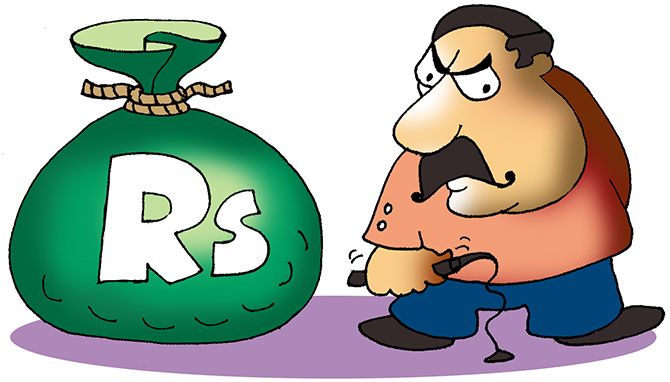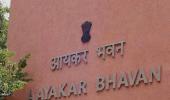'The deeper problem is big government -- a giant monster with a giant appetite, which requires it to put more and more pressure on tax officials to extort.
'And the monster is getting bigger by the day. But then, Mr Modi too knows this,' says Debashis Basu.
Illustration: Uttam Ghosh/Rediff.com

In March last year, Ashok Singh (name changed), a former employee of a multinational company, was slapped with a prosecution notice under Section 276CC of the Income-Tax Act for failing to file his income-tax return for 2011-12 (assessment year 2012-13) in time.
The possible punishment? If the tax amount is more than Rs 1 lakh, rigorous imprisonment for at least six months and a maximum of seven years, and a fine.
Ashok had quit his job to start a consulting company in 2012.
In 2011-12 he got his salary for the period of employment (tax was deducted at source and paid by his employer) and for the rest of the year he earned a consulting income.
In 2012, he had a serious health crisis in the family apart from the pressure of setting up his consultancy.
This led him to miss the due date -- August 31, 2012 -- for filing his 2011-12 (AY2012-13) tax return.
Since filing the return was time-barred, he filed his return in February 2015 after paying tax and interest.
Clearly, he was not a tax evader and the I-T department didn’t bother about him for three years.
He acted voluntarily by paying both tax and interest.
Still, the prosecution summons mentions that he wilfully evaded tax.
He explained the reasons for his slip and requested the prosecution proceedings be dropped.
The department still went ahead and arrested him.
After all, we live in a new Swachch Bharat, where netas and babus are pure and pristine and the rest of us have to be taught hard lessons for failing to follow hundreds of different kinds of draconian rules everyday.
In July this year, Ashok appeared in the metropolitan magistrate’s court with trepidation.
Fortunately, his lawyer secured bail for him.
What are his options now?
Before I come to that, let me go to the broader issue of taxtortion or tax terrorism, which is getting a lot of media attention these days.
Most people, including Mohandas Pai, a strong supporter of the government and a former board member of Infosys, believe that overzealous tax officials are responsible for taxpayers’ problems.
This is the dominant narrative.
When Prime Minister Narendra Modi was recently asked about tax terrorism, he said: “It is a fact that some black sheep in the tax administration may have misused their powers and harassed taxpayers, either by targeting honest assessees or by taking excessive action for minor or procedural violations … I have also instructed … to ensure that honest taxpayers are not harassed and those who commit minor or procedural violations are not subjected to disproportionate or excessive action.”
The real source of the problems
Blaming tax officials will not help us get to the root of the issue.
The problem is government itself, in two important ways.
One, tax laws and circulars are draconian, and getting more and more so everyday. Officials are merely enforcing them.
Two, the bigger problem is stiff revenue collection targets the ministry sets for tax officials, forcing them to take “excessive action”, or face harassment for letting go of a single rupee of tax claimed.
To understand the first, let’s go back to Ashok’s condition and what he can do to avoid a jail term.
For his delay he can “compound” his offence, that is, pay money to the government.
Guess how much?
On June 14 this year, the government announced compounding fees under Section 276CC.
For failure to furnish returns of income, the default period will be computed from the due date to the date of filing of returns or completion of assessment, whichever is earlier, and the compounding fees will be Rs 2,000 per day.
On a rough calculation, in Ashok’s case, this works out to more than Rs 16 lakh in addition to other charges.
The same is the story of another finance consultant.
She inadvertently missed a small part of other income.
She voluntarily disclosed it and paid the dues.
Some 10 years later, she was slapped a prosecution notice with a jail term. She paid Rs 12 lakh as compounding fees.
The chief income-tax commissioner agreed that it was unfair but he couldn’t do anything about it.
It’s the law. Space constraints prevent me from giving more examples of such unfairness but any tax consultant has a list of them.
The second issue -- stiff revenue targets -- is an old one.
P Chidambaram as finance minister was notorious for setting difficult targets and thereby unleashing tax terrorism.
This government is more focused and determined than the previous one. You can imagine the consequences.
The solution to both is not merely to rein in “overzealous” tax officials.
If you have a damp wall, you don’t paint it. You go deeper and locate where the dampness is coming from.
In this case, the deeper problem is big government -- a giant monster with a giant appetite, which requires it to put more and more pressure on tax officials to extort.
And the monster is getting bigger by the day. But then, Mr Modi too knows this.
Remember the 2014 pre-election slogan “minimum government, maximum governance”?
If there is less pressure on raising resources, honest taxpayers can be spared taxtortion. How difficult is this to understand?
Debashis Basu is the editor of www.moneylife.in











